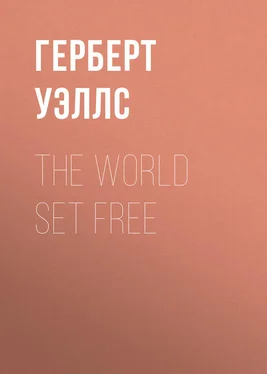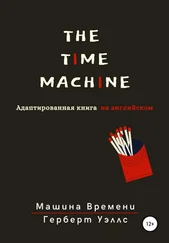Герберт Уэллс - The World Set Free
Здесь есть возможность читать онлайн «Герберт Уэллс - The World Set Free» — ознакомительный отрывок электронной книги совершенно бесплатно, а после прочтения отрывка купить полную версию. В некоторых случаях можно слушать аудио, скачать через торрент в формате fb2 и присутствует краткое содержание. Жанр: foreign_antique, foreign_prose, на английском языке. Описание произведения, (предисловие) а так же отзывы посетителей доступны на портале библиотеки ЛибКат.
- Название:The World Set Free
- Автор:
- Жанр:
- Год:неизвестен
- ISBN:нет данных
- Рейтинг книги:5 / 5. Голосов: 1
-
Избранное:Добавить в избранное
- Отзывы:
-
Ваша оценка:
- 100
- 1
- 2
- 3
- 4
- 5
The World Set Free: краткое содержание, описание и аннотация
Предлагаем к чтению аннотацию, описание, краткое содержание или предисловие (зависит от того, что написал сам автор книги «The World Set Free»). Если вы не нашли необходимую информацию о книге — напишите в комментариях, мы постараемся отыскать её.
The World Set Free — читать онлайн ознакомительный отрывок
Ниже представлен текст книги, разбитый по страницам. Система сохранения места последней прочитанной страницы, позволяет с удобством читать онлайн бесплатно книгу «The World Set Free», без необходимости каждый раз заново искать на чём Вы остановились. Поставьте закладку, и сможете в любой момент перейти на страницу, на которой закончили чтение.
Интервал:
Закладка:
At one blow Barnet found himself flung out of the possessing, spending, enjoying class to which he belonged, penniless and with no calling by which he could earn a living. He tried teaching and some journalism, but in a little while he found himself on the underside of a world in which he had always reckoned to live in the sunshine. For innumerable men such an experience has meant mental and spiritual destruction, but Barnet, in spite of his bodily gravitation towards comfort, showed himself when put to the test, of the more valiant modern quality. He was saturated with the creative stoicism of the heroic times that were already dawning, and he took his difficulties and discomforts stoutly as his appointed material, and turned them to expression.
Indeed, in his book, he thanks fortune for them. ‘I might have lived and died,’ he says, ‘in that neat fool’s paradise of secure lavishness above there. I might never have realised the gathering wrath and sorrow of the ousted and exasperated masses. In the days of my own prosperity things had seemed to me to be very well arranged.’ Now from his new point of view he was to find they were not arranged at all; that government was a compromise of aggressions and powers and lassitudes, and law a convention between interests, and that the poor and the weak, though they had many negligent masters, had few friends.
‘I had thought things were looked after,’ he wrote. ‘It was with a kind of amazement that I tramped the roads and starved – and found that no one in particular cared.’
He was turned out of his lodging in a backward part of London.
‘It was with difficulty I persuaded my landlady – she was a needy widow, poor soul, and I was already in her debt – to keep an old box for me in which I had locked a few letters, keepsakes, and the like. She lived in great fear of the Public Health and Morality Inspectors, because she was sometimes too poor to pay the customary tip to them, but at last she consented to put it in a dark tiled place under the stairs, and then I went forth into the world – to seek first the luck of a meal and then shelter.’
He wandered down into the thronging gayer parts of London, in which a year or so ago he had been numbered among the spenders.
London, under the Visible Smoke Law, by which any production of visible smoke with or without excuse was punishable by a fine, had already ceased to be the sombre smoke-darkened city of the Victorian time; it had been, and indeed was, constantly being rebuilt, and its main streets were already beginning to take on those characteristics that distinguished them throughout the latter half of the twentieth century. The insanitary horse and the plebeian bicycle had been banished from the roadway, which was now of a resilient, glass-like surface, spotlessly clean; and the foot passenger was restricted to a narrow vestige of the ancient footpath on either side of the track and forbidden at the risk of a fine, if he survived, to cross the roadway. People descended from their automobiles upon this pavement and went through the lower shops to the lifts and stairs to the new ways for pedestrians, the Rows, that ran along the front of the houses at the level of the first story, and, being joined by frequent bridges, gave the newer parts of London a curiously Venetian appearance. In some streets there were upper and even third-story Rows. For most of the day and all night the shop windows were lit by electric light, and many establishments had made, as it were, canals of public footpaths through their premises in order to increase their window space.
Barnet made his way along this night-scene rather apprehensively since the police had power to challenge and demand the Labour Card of any indigent-looking person, and if the record failed to show he was in employment, dismiss him to the traffic pavement below.
But there was still enough of his former gentility about Barnet’s appearance and bearing to protect him from this; the police, too, had other things to think of that night, and he was permitted to reach the galleries about Leicester Square – that great focus of London life and pleasure.
He gives a vivid description of the scene that evening. In the centre was a garden raised on arches lit by festoons of lights and connected with the Rows by eight graceful bridges, beneath which hummed the interlacing streams of motor traffic, pulsating as the current alternated between east and west and north and south. Above rose great frontages of intricate rather than beautiful reinforced porcelain, studded with lights, barred by bold illuminated advertisements, and glowing with reflections. There were the two historical music halls of this place, the Shakespeare Memorial Theatre, in which the municipal players revolved perpetually through the cycle of Shakespeare’s plays, and four other great houses of refreshment and entertainment whose pinnacles streamed up into the blue obscurity of the night. The south side of the square was in dark contrast to the others; it was still being rebuilt, and a lattice of steel bars surmounted by the frozen gestures of monstrous cranes rose over the excavated sites of vanished Victorian buildings.
This framework attracted Barnet’s attention for a time to the exclusion of other interests. It was absolutely still, it had a dead rigidity, a stricken inaction, no one was at work upon it and all its machinery was quiet; but the constructor’s globes of vacuum light filled its every interstice with a quivering green moonshine and showed alert but motionless – soldier sentinels!
Конец ознакомительного фрагмента.
Текст предоставлен ООО «ЛитРес».
Прочитайте эту книгу целиком, купив полную легальную версию на ЛитРес.
Безопасно оплатить книгу можно банковской картой Visa, MasterCard, Maestro, со счета мобильного телефона, с платежного терминала, в салоне МТС или Связной, через PayPal, WebMoney, Яндекс.Деньги, QIWI Кошелек, бонусными картами или другим удобным Вам способом.
Интервал:
Закладка:
Похожие книги на «The World Set Free»
Представляем Вашему вниманию похожие книги на «The World Set Free» списком для выбора. Мы отобрали схожую по названию и смыслу литературу в надежде предоставить читателям больше вариантов отыскать новые, интересные, ещё непрочитанные произведения.
Обсуждение, отзывы о книге «The World Set Free» и просто собственные мнения читателей. Оставьте ваши комментарии, напишите, что Вы думаете о произведении, его смысле или главных героях. Укажите что конкретно понравилось, а что нет, и почему Вы так считаете.


![Герберт Уэллс - The War of the Worlds [С англо-русским словарем]](/books/26611/gerbert-uells-the-war-of-the-worlds-s-anglo-thumb.webp)









